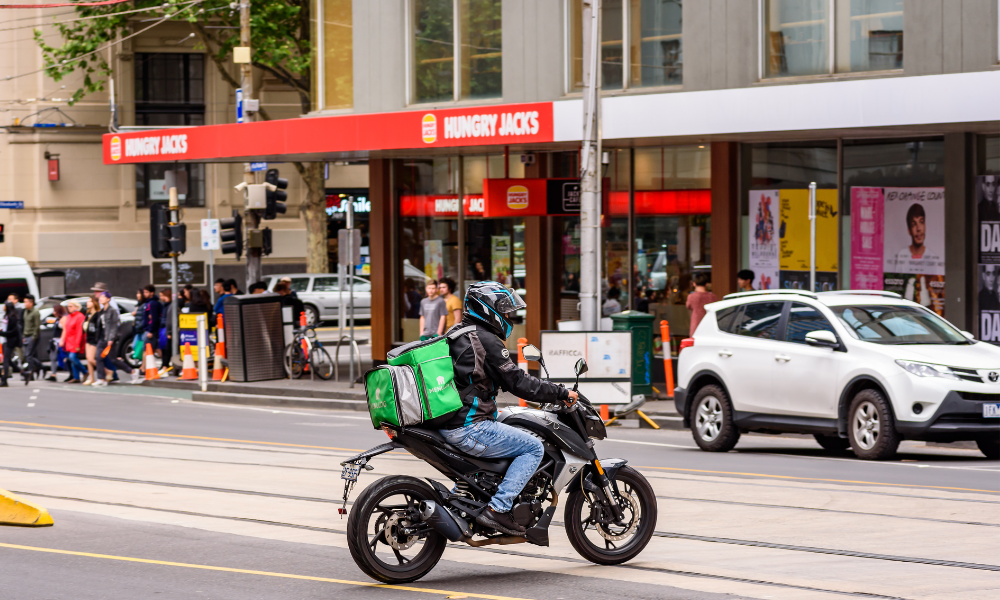
Winning the legal battle is 'just the first step' - what's next for the gig economy?

The fight for workers’ rights continues for the widow of a food delivery rider who died in Sydney after winning a legal battle against the food delivery company Hungry Panda.
In September 2020, Xiaojun Chen was riding a motorbike for Hungry Panda when a bus hit him in the inner-Sydney suburb of Zetland, ABC News reported.
“He was one of five delivery riders to die on Australian roads within the space of three months that year,” ABC News said.
The media news outlet said Chen’s intention to work in Australia was mainly to support his family back in China and save money so they could put up their own business.
“My husband was very willing to help other people,” the wife of Chen, Lihong Wei, told 7.30. through a Mandarin translator from her home in China. “He was a very good father, a good husband, and a good son.”
The couple has two children, and Wei said that even when the incident happened two years ago, her two children are still struggling to deal with the loss of their father, ABC News said.
“My daughter and my son have lost their father forever, I have lost my husband forever, and the entire family has been in great grief,” Wei told 7.30.
According to ABC News, Wei’s legal battle against Hungry Panda started after the death of his husband.
“Within weeks of her husband’s death, she braved the global pandemic, travelling from China to Sydney to give evidence to a New South Wales parliamentary inquiry into the gig economy,” the news outlet said.
While the food delivery company supported Wei, ABC News reported that the inquiry heard Hungry Panda was not “legally obliged” to pay compensation to Wei because Chen, after all, was a contractor, not an employee.
“Gig workers are not usually entitled to workers compensation under the state system because they are independent contractors,” ABC News said.
Moreover, it was found that Hungry Panda did not report Chen’s death to the workplace and health safety regulator SafeWork New South Wales (NSW) in a “timely manner,” according to the news outlet.
Thus, Wei took the necessary legal actions against the company, and in June 2022, the Personal Injury Commission awarded Wei $830,000, ABC News reported. It further said that Hungry Panda did not respond to 7.30’s inquiries.
“I hope I can fight for the rights and protections delivery riders deserve to have,” Wei told 7.30. “I also hope that no other family suffers the sadness and pain we have experienced. I hope things like this will never happen again.”
According to ABC News, the Commission later found that Hungry Panda indeed employed Chen, and this finding could also pave the way for other cases.
Wei’s fight for workers’ rights was an “extraordinary public battle,” and her courage has inspired many individuals, ABC News said.
“It’s been absolutely humbling to see how she [Wei] came out and fought in the depths of her grief,” national secretary of the Transport Workers’ Union, Michael Kaine, told 7.30.
While gig companies assure that contractors enjoy the flexibility and freedom to work across platforms, union sectors have argued that industry practices have continuously tarnished the fundamental rights of workers to a safe and fair workplace, ABC News reported.
“Riders are paid little per order as they compete to deliver takeaway on busy roads, and are not entitled to the benefits of employees, such as the minimum wage, superannuation or sick leave,” ABC News said.
To address the issue, Tony Burke, minister for workplace relations, said that the government would open the way for the creation of minimum standards for gig workers, according to the news outlet.
“The only way to deal with this is to have government action,” Burke said. “The only way to change the situation for these exploited workers is to legislate and that’s what we’ll do.”
Meanwhile, Uber, Deliveroo, Menulog, and DoorDash, during an interview with 7.30, pledged their support for delivery riders and said they would work with the federal government on improving standards.